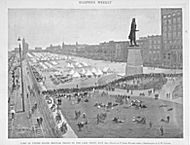| Entries |
| P |
|
Pullman Strike
|
The most famous and farreaching labor conflict in a period of severe economic depression and social unrest, the Pullman Strike began May 11, 1894, with a walkout by Pullman Palace Car Company factory workers after negotiations over declining wages failed. These workers appealed for support to the American Railway Union (ARU), which argued unsuccessfully for arbitration. On June 20, the ARU gave notice that beginning June 26 its membership would no longer work trains that included Pullman cars.

|
While the use of an injunction for such purposes, upheld by the Supreme Court in 1895, was a setback for unionism, and while most public sentiment was against the boycott, George Pullman attracted broad criticism and his workers wide sympathy. A federal panel appointed to investigate the strike sharply criticized the company's paternalistic policies and refusal to arbitrate, advancing the idea of the need for unions and for increased government regulation in an age of large-scale industrialization.
The Encyclopedia of Chicago © 2004 The Newberry Library. All Rights Reserved. Portions are copyrighted by other institutions and individuals. Additional information on copyright and permissions.